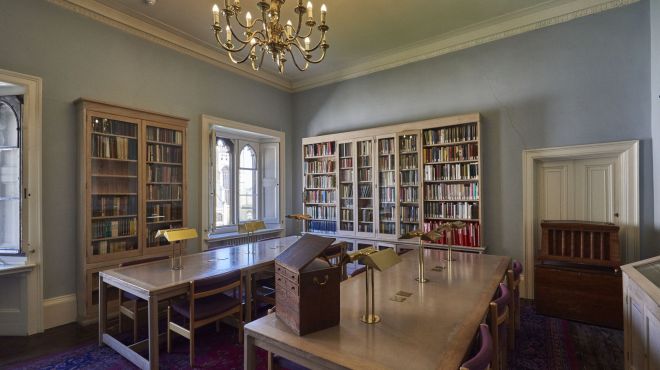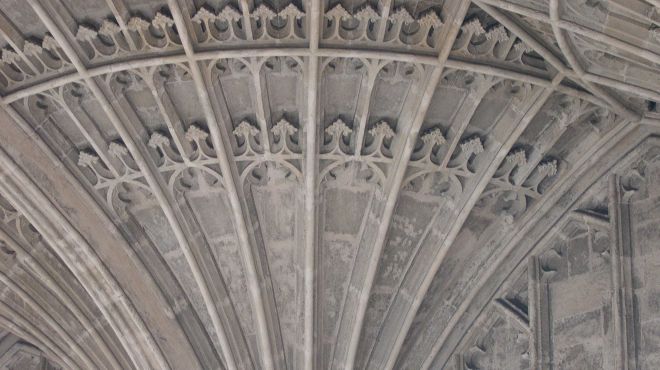Library user guide
Useful information on visiting and using the Library

On this page
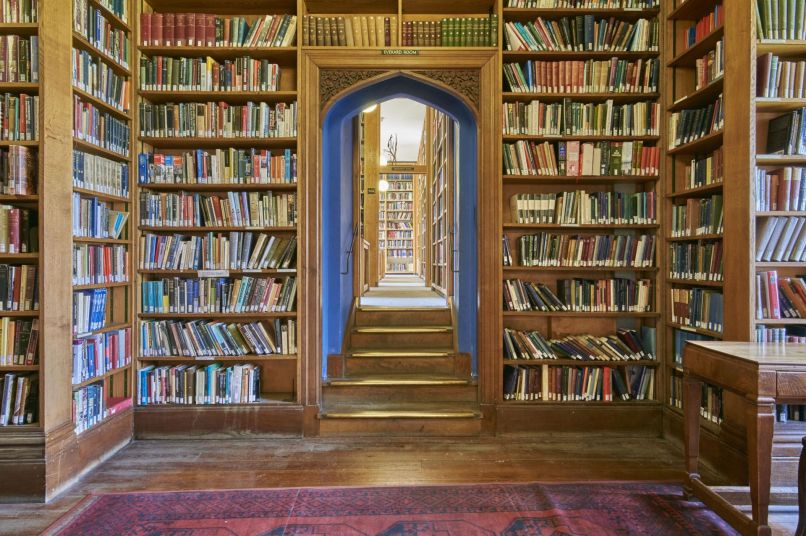
Introduction
King’s College Library has been in continuous existence since the founding of the College in 1441. The first catalogue dates from 1452; the present Library building was built by William Wilkins between 1824 and 1828 and is situated in Webb's Court.
With approximately 130,000 books, the Library’s chief purpose is to provide resources and a study space for members of College. In addition, it holds significant collections of rare books and archives.
The College Library is part of the much wider library system of the university, including the University Library (one of six legal deposit libraries in the UK), and the faculty and departmental libraries. The catalogues of these libraries are accessible via iDiscover which also acts as a gateway to external electronic resources
Cambridge also has a good public library, Cambridge Central Library, in Lion Yard, which is home to the Cambridgeshire Collection local studies library
Finding books on your subject
Main Library (first floor)
The Library uses the Bliss classification scheme, which assigns a lettered code known as a classmark to each book. The books are arranged in alphabetical sequence starting at the entrance on the left-hand side, going round the Library in a clockwise loop and finishing at the right-hand side of the Library.
| 7N Computer Science | E Biology | NW Local Collection (top-floor corridor) | WH Literature in general |
| 8 Bibliography | F Botany | O American/Asian/African History | XB Russian |
| A Philosophy | G Zoology | P Theology | XM Italian |
| AL Logic | H Medicine | Q Social Welfare and Criminology | XP Spanish |
| AM Mathematics | I Psychology | R Politics | XR Portuguese |
| AY Statistics | J Education | S Law | XS French |
| AZ History & Philosophy of Science | K Sociology | T Economics | XW German |
| B Physics and Engineering | KZ Travel | U Technology | Y English |
| C Chemistry | LA Archaeology | V Art | Z Classics |
| D Astronomy | L/M General and European History | VV/VW Music (in Rowe Music Library) | Ref Reference books (not borrowable) |
| DH Earth Sciences | N British History | W Linguistics | Welfare Welfare Collection (in Computer Room) |
Rowe Music Library (top floor)
Scores
| Rw.11-16 instrumental solos and duets | Rw.38 books of exercises and music lesson books | Rw.84 secular vocal scores | Rw.111-112 songs: musicals and miscellaneous |
| Rw.19 & 24 trios | Rw.49-50 oratorio vocal scores | Rw.101-103 piano solo; vocal music with piano accompaniment | Rw.113 secular choral music |
| Rw.30-31 quartets, quintets and higher | Rw.51-61 piano solo | Rw.104 orchestral parts | Rw.114-116 sacred choral music |
| Rw.32 organ | Rw.73-75 miniature scores, arranged by composer | Rw.105-108 oversize full scores | Rw.117-120 songs: German, Spanish, French, Italian, Russian |
| Rw.33-34 piano duets | Rw.81-3 opera scores (full scores and vocal scores) | Rw.109-110 songs: mostly English language | Rw.122 facsimiles |
Books about music
VV Music (general)
VV 6 Study of music
VV 7 History of music (general)
VV 8 Histories and overviews of music (by country)
VV 9 Individual composers: biography and criticism
VWA Theory
VWB Composing and producing; techniques
VWC Musical character
VWD Elements of music
VWE Forms of music
VWF-VWW Music for particular instruments, and for voice
VWX Folk music in the European tradition
VWY-VWZ Non-European music
Special Locations
Books designated ‘oversize’ because they are too large to fit on the normal shelves are marked with green dots on their spines and located on the lowest shelves. Books shelved behind the normal sequence are marked with blue dots or labelled ‘Behind’. Past examination papers are kept in the Computer Room, which is also the location of the Welfare Collection.
The Local Collection of books with local interest is located on the top-floor corridor. All music books and printed music are located on the top floor in the Rowe Music Library.
Finding your way around the Library
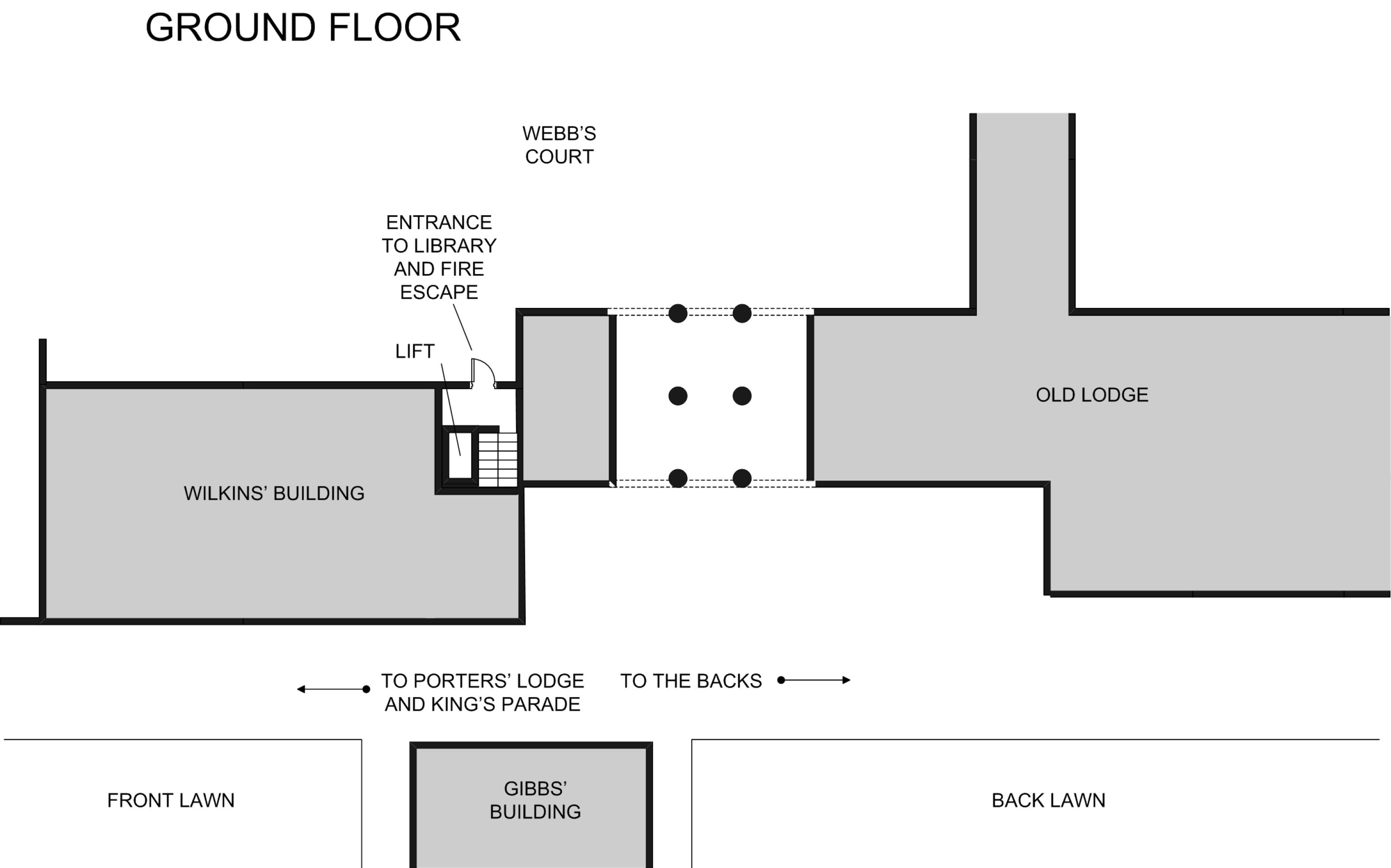
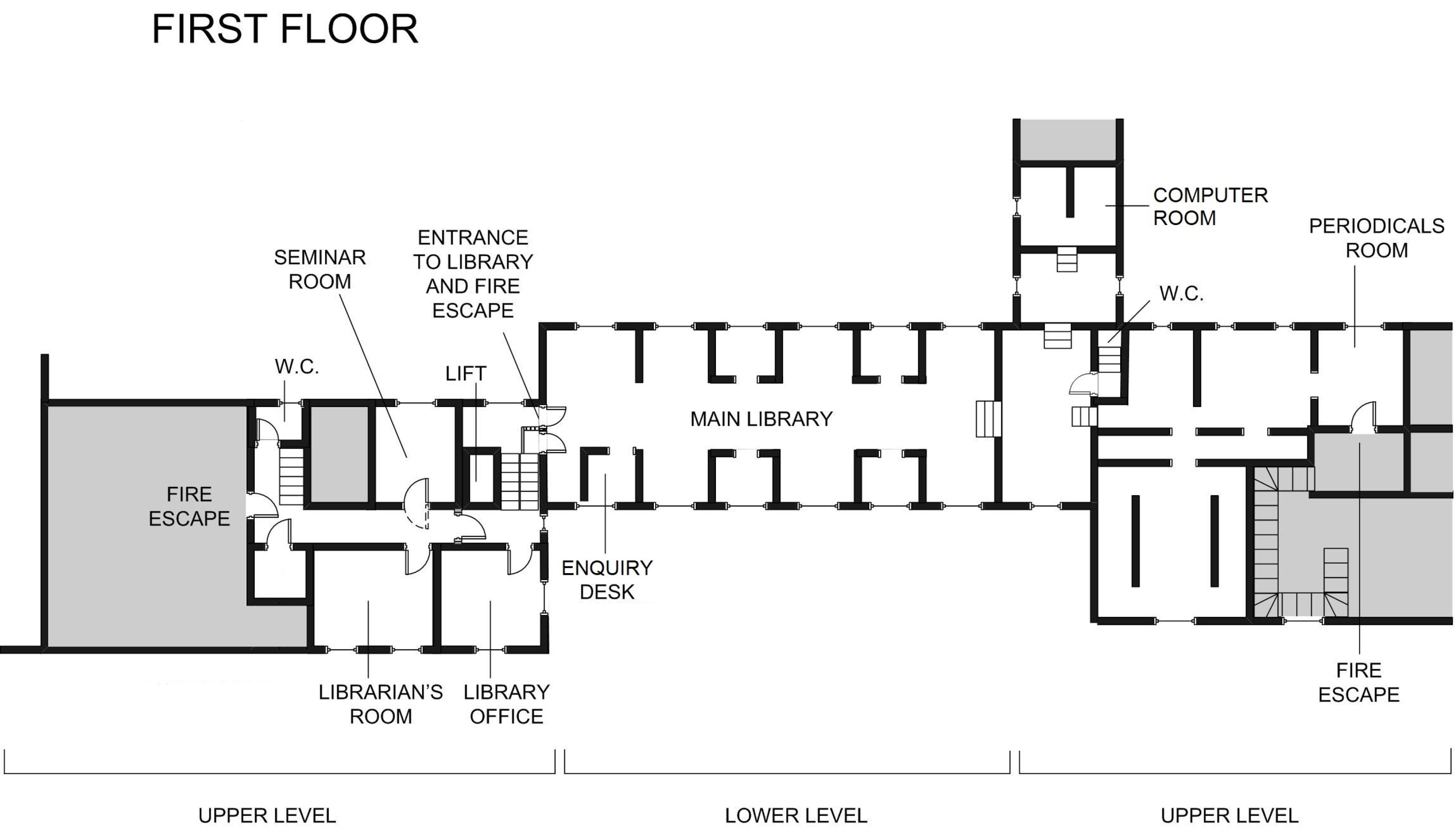
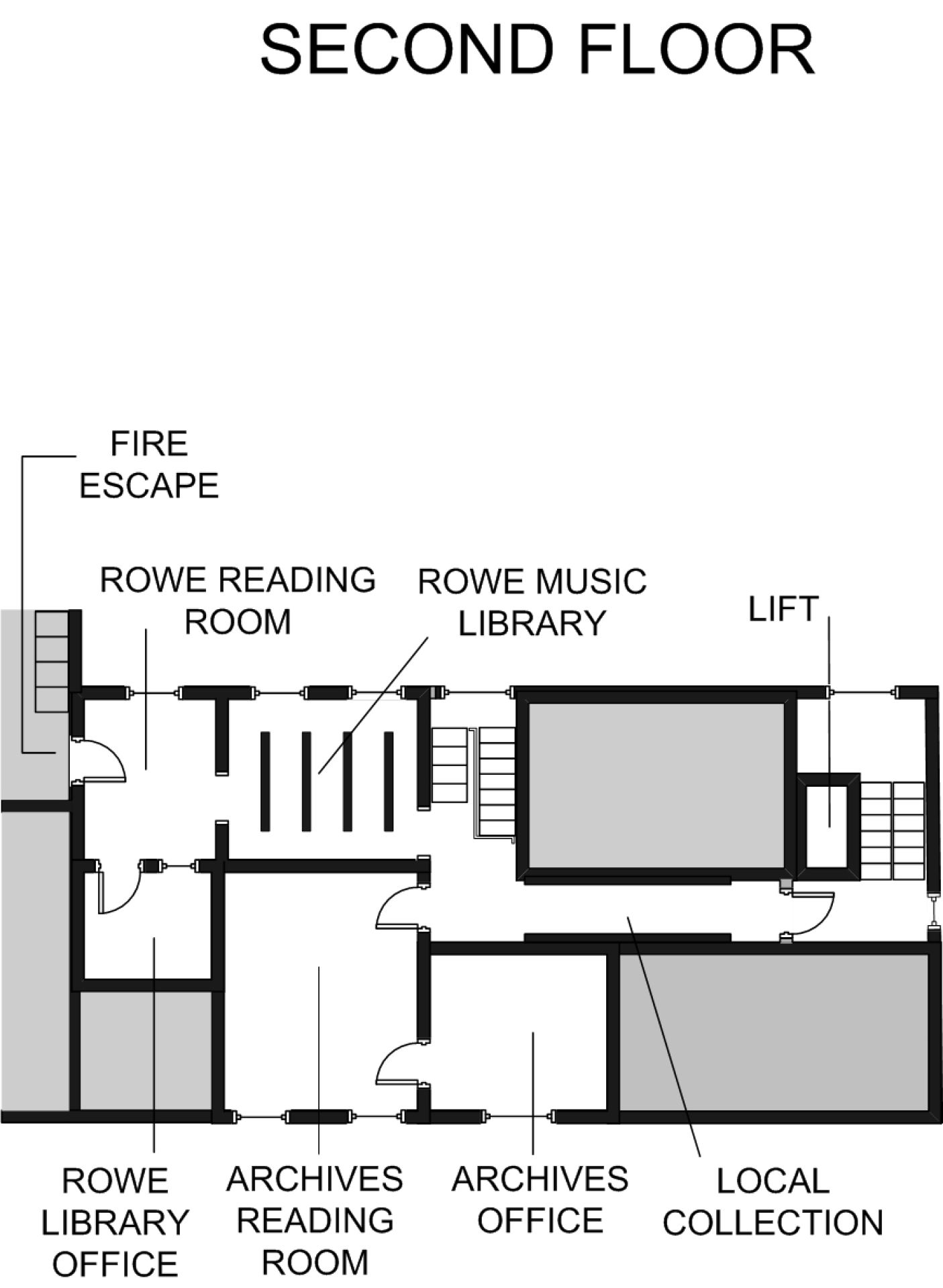
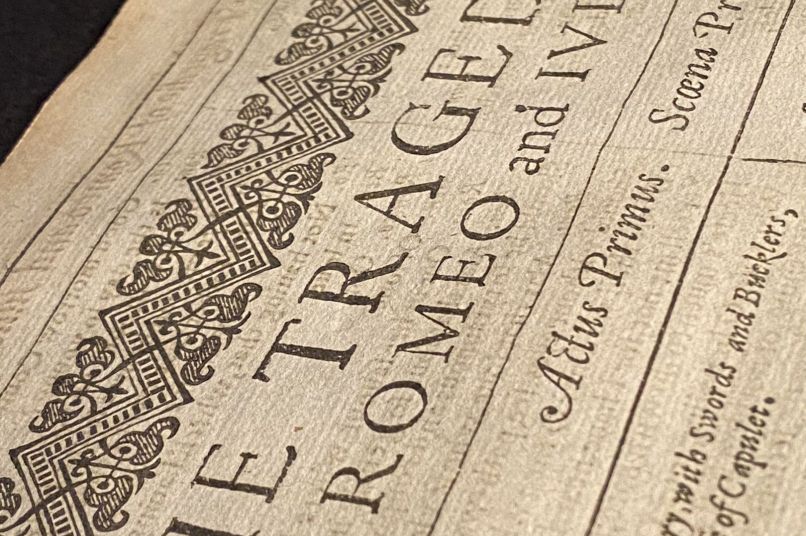
Library rules
The Library is a place for quiet study, and we ask that you respect fellow users by observing the following rules:
- Noise should be kept to a minimum, and if you need to make or receive a phone call you should do so outside the Library building
- Food and drink are not permitted in the Library, with the exception of bottled water; there is a water cooler on the upper first floor that can be used to refill your bottle
- Smoking, including all types of e-cigarette, is forbidden in the Library
- Do not bring non-members of King’s College into the Library; if you wish to study with friends from other colleges, please do so in your faculty/departmental library or the University Library
Students found to be in breach of these rules will be referred to the Lay Dean.
In order to assist with maintaining the safety and security of College members and visitors, the Library is covered by the College-wide CCTV system.
Library catalogues
Online Catalogue
The Libary's online catalogue includes records for all material on open access in King’s College Library and can be accessed either from one of the catalogue terminals at the front of the Library or from any device with internet access. When you search for a book, make a note of the call number (i.e. the book’s classmark) on the results page, as this tells you where to look for the book on the shelves.
Although King’s College Library’s books are listed on the University catalogue, iDiscover you should use the College catalogue when searching for books at King’s, as it is kept more up to date and will tell you whether each book is available or on loan, which iDiscover does not.
My Account
To log into your account on the online catalogue, type your User ID (the five-character barcode from the back of your university card) into the box in the top right-hand corner and click ‘Login to e-Library’. The default PIN setting is blank, though once logged in you can create a PIN to secure your account if you wish. From the ‘My Account’ page, accessible via the link on the purple toolbar, you can check which books you have on loan, and renew books remotely at the end of term.
Recalling books
If a book in the catalogue is shown to be on loan and you wish to borrow it, it is possible to recall the book. Click ‘Place Hold’ from the left-hand menu, enter your User ID and PIN (if you have one), and click ‘Place Hold’ once more. You will be notified by email when the book is available.
Purchase requests
You can also use the online catalogue to request the purchase of a book for your studies. Click the ‘Recommend to Purchase’ link on the purple toolbar, then fill in the form that appears. You will be notified by email when the book is available.
Handwritten Catalogue
This consists of the handwritten volumes shelved in the catalogue bay adjacent to the Enquiry Desk. You may need to consult this catalogue if you are looking for rare materials that have not yet been catalogued online. Entries are arranged alphabetically by author or editor, or by title in the case of anonymous works. Each entry gives the classmark or shelfmark of the book. A red ‘S’, or similar symbol, indicates that a book has been placed in store. You should ask one of the librarians at the Enquiry Desk if you wish to access rare books, but please give reasonable notice, as immediate fetching is seldom possible. Most rare books must be read in the Library or Archive Centre when staff are present.
Rowe Music Library Catalogue
All open-access music books and some scores have been entered on the online catalogue, and a project to add the remaining scores to the catalogue is ongoing. All items that have been catalogued in this way can be found on the online catalogue and borrowed via the loans terminal in the Main Library. Scores not yet catalogued online can be found using the series of typed catalogue books in the Rowe Library reading room on the top floor. If you wish to borrow an item that has not yet been catalogued (and so has no barcode for borrowing on the loans terminal), please present it to a librarian at the Enquiry Desk and they will put it on your account.
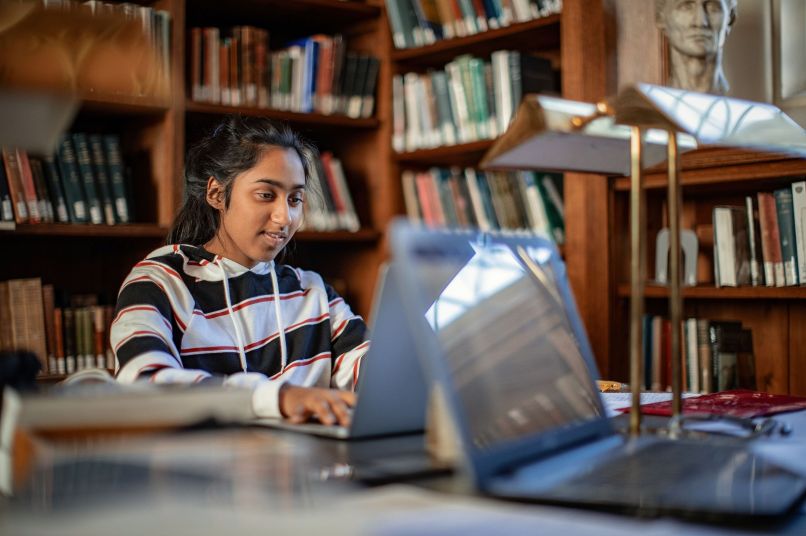
How to borrow items
Self-service borrowing, returning and renewing
The self-service loans terminal is next to the Enquiry Desk at the front of the Library. You will need your university card to take books out. If the screen is black, move the mouse to bring the computer out of screen saver mode.
Start the borrowing procedure by pressing the ‘BORROW’ key (F2) on the keyboard. Use the scanner to scan the
barcode on your university card, and make sure your name comes up on the screen. Scan the barcode inside the front cover of the
book you wish to borrow.
You will see something like this on the screen:
The due date should be that of the next book return period. Press F2 again to clear your name from the screen.
Returning
To return a book, press the ‘RETURN’ key (F3) on the keyboard, and use the scanner to scan the barcode inside the front cover of the book. You do not need to scan your university card. Repeat the procedure for any further books. Leave all returned books on the shelf to the right of the computer; please do not reshelve returned books yourself. If the book has been recalled for someone else, the message ‘Item has holds’ will flash up on the screen; in this case, please give the book to a member of staff.
Renewing
It is not necessary to bring books into the Library to renew them at book return periods. Our recommended option is to renew books remotely via the catalogue.
It is possible to renew books in person at the loans terminal by pressing the ‘RENEW’ key (F4) on the keyboard, and then scanning the barcode of the book. The book will be renewed for the original borrower.
If the book has been recalled for someone else, the message ‘Item has holds’ will flash up on the screen, and you will not be able to renew it; in this case, please RETURN the book on the computer and give it to a member of staff.
Borrowing items without barcodes
To borrow an item that has not yet been catalogued online and so does not have a barcode (e.g. some music scores), take it to the
Enquiry Desk and staff will put it on your account.
Books borrowed by you are your responsibility, even if you pass them to another user. The borrower will be charged the cost of replacement for any book that has been lost, seriously defaced or annotated in any way.
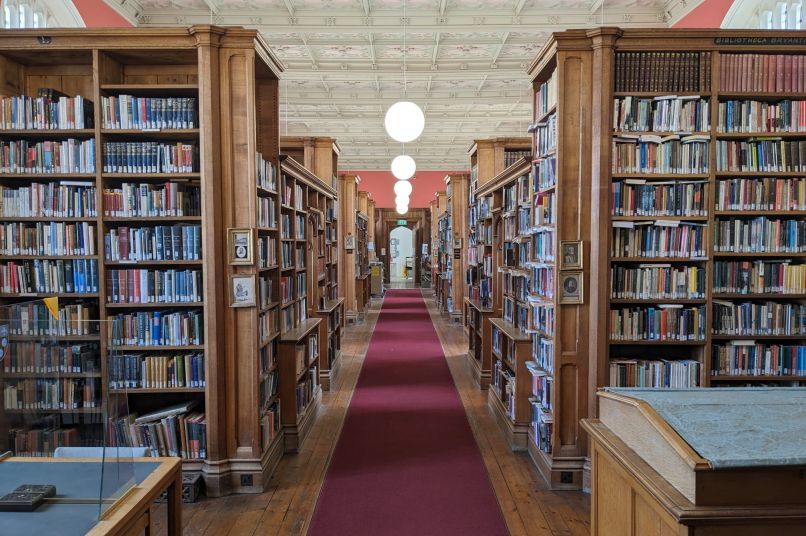
Reserving books on desks
A maximum of 10 borrowable books can be left on the tables in a neat pile for 5 days. Fill in and date a ‘Please leave’ slip and position it like a bookmark inside the top book of the pile, with one end outside the book, for inspection. Books left without slips, or with undated or out-of-date slips, will be removed and reshelved.
Internet access and study aids
Wi-Fi and internet connection
There is Wi-Fi throughout the Library. There are also ports under many of the desks to plug in an ethernet cable if required.
Network computers and printing
In the Computer Room there are several network computers, which provide access to a range of software and your personal file store. There is also a combined printer/scanner/photocopier known as the Multi-Function Device (MFD). You can print to the MFD either from the computers or from your own device.
To enable printing from your own device, follow the instructions on the University Information Services (UIS) website at or consult the posters in the Computer Room.
You can also add print credit to use for printing and copying via the Managed Print Portal.
Study aids
There is an articulated skeleton in the Library for the use of medical students, and several artificial skulls, which may be borrowed as 3-day loans. There are also a small number of book stands that may be used in the Library, and pairs of disposable earplugs in case you are bothered by noise. To use these items, please ask at the Enquiry Desk.
Further resources
Audiovisual resources
The College subscribes to Naxos Music Library, which is a large online classical music streaming service with over 3,000,000 tracks of music from hundreds of thousands of albums. Members of College can ask to be put on the Library’s list of approved IP addresses so that they can access the service. The Library holds collections of CDs and of DVDs of mainstream and foreign-language films, which are available for loan. These collections are not on open access, but can be searched on the catalogue. To borrow from these collections, please ask a member of staff.
Welfare collection
The Library houses a small collection of books on subjects such as health, self-help, student life, gender, sexuality, race, religion, travel, accommodation and careers. They are shelved in the Computer Room and can be borrowed. Please feel free to recommend other titles to add to the collection.

